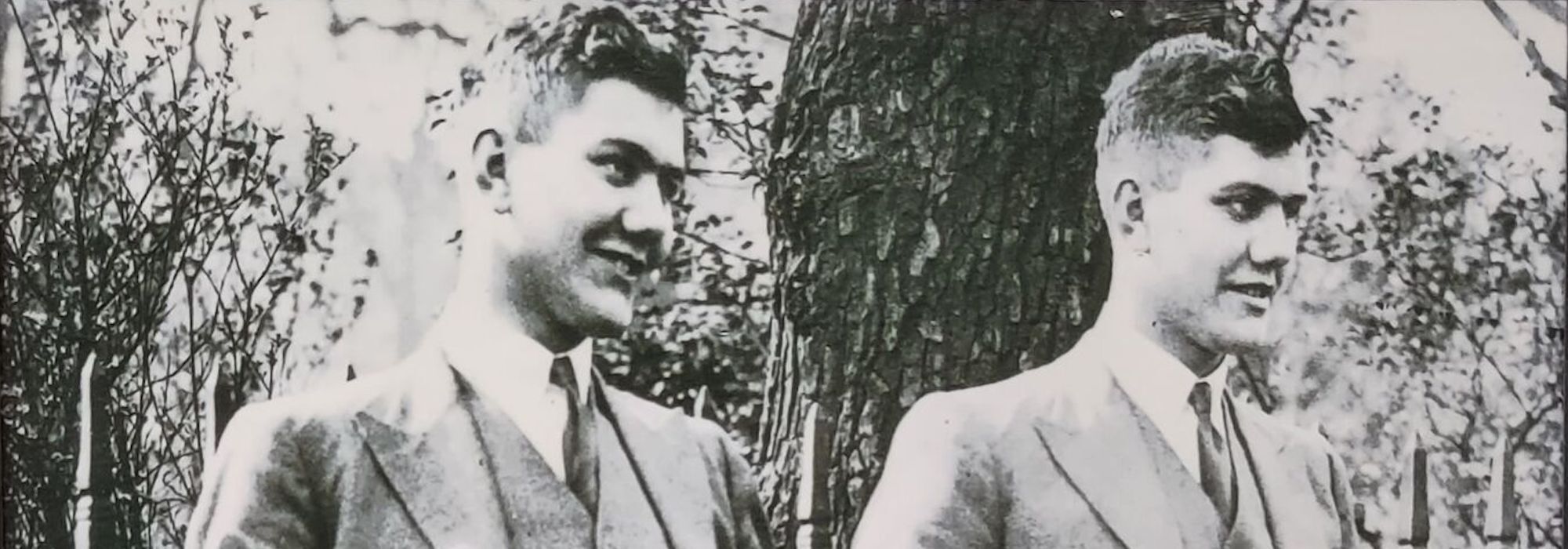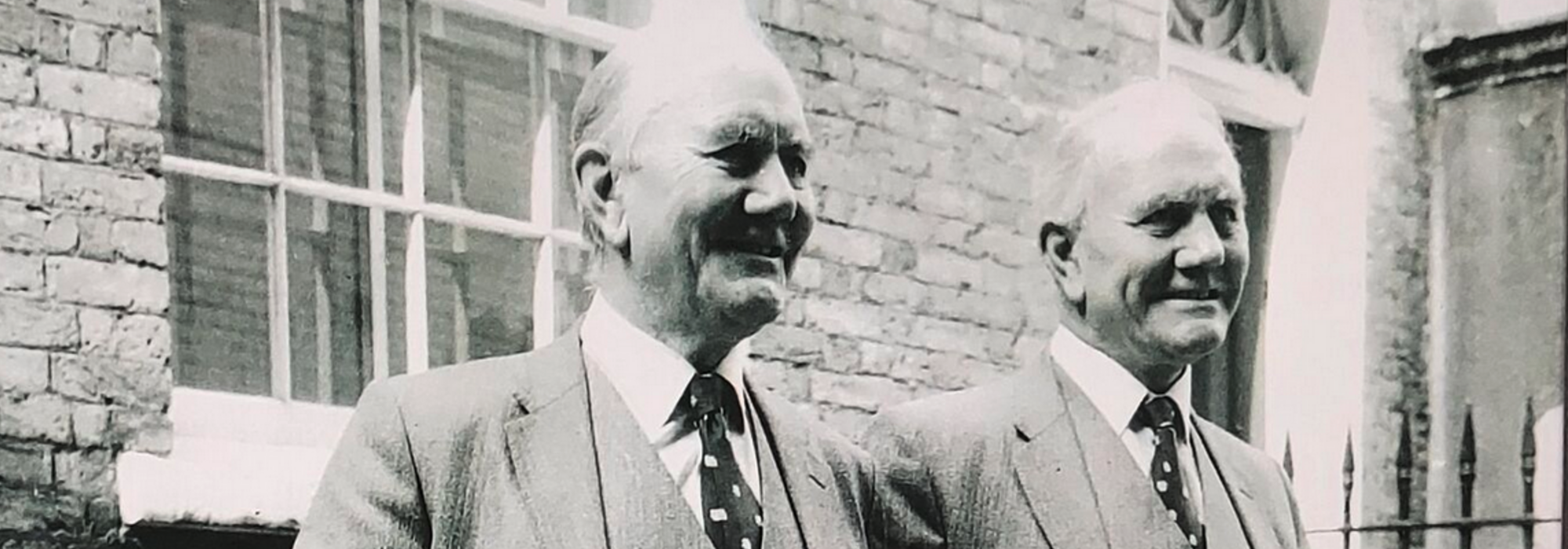The Bedser Twins
Alec and Eric Bedser
Eric and Alec Bedser were identical twins, born in Reading, Berkshire on 4 July 1918. Eric was born 10 minutes before his twin brother Alec. Their father served in the Royal Flying Corps in the First World War, later becoming a bricklayer. He also played cricket and football.
The Bedser twins were regarded as 'inseparable' and had a strong affinity which they found hard to explain; they would wear identical clothes even when apart, could finish each other's sentences and were never happy when separated.
The Bedser brothers began playing cricket together at age seven for local school sides and Woking Cricket Club. Both twins also played football for Surrey Boys, and considered a professional career in that sport. They were educated at Maybury Junior School and Monument Hill Central School. From the age of 14, the twins worked as clerks at a solicitor's office in Lincoln's Inn Fields. They were spotted by Surrey coach Alan Peach in 1938 and joined the Surrey county squad staff at the Oval, making their first-class debuts in the same match in June 1939.
The pair were called up for duty with the Royal Air Force in 1939, serving in France and being evacuated from Dunkirk. They later served variously together throughout the war, in North Africa and Italy. Eric was promoted to Warrant Officer (and Alec refused a similar promotion, staying a flight sergeant so they could stay together), and both being demobilised in 1946, and returned to cricket at Surrey.
After retiring from playing cricket the brothers went into business together. Among other business interests, they co-operated with Ronald Straker in a successful stationery firm, Straker-Bedser, which was later taken over by Ryman in 1977. While Alec became a selector for England, Eric served on various committees at Surrey. He was president of Surrey County Cricket Club in 1990.
Neither twin married, living together in a house that they built with their father in 1953 in Woking, until Eric died aged 87 in Woking.

Eric Bedser 1918-2006
Eric Arthur Bedser (4 July 1918 - 24 May 2006) played for Surrey County Cricket Club and was widely regarded as one of England's top bowlers of the 20th century. Eric was an all-rounder, a useful right-handed batsman and right-arm off-spin bowler.
Bedser enjoyed a successful first-class career, a member of the Surrey team that won seven successive County Championships from 1952 to 1958, despite being called up to a Test Trial in 1950, in which Laker took 8 wickets for 2 runs, one of which was scored by Eric, he was never called to play in a Test himself: he played for England only once, in a first-class tour match in Tasmania. As a result, Eric's record will always be lacking when compared with Alec's, who played in 51 Test matches, although Eric often accompanied Alec on overseas tours.
In a first-class career that lasted twenty-three years, Bedser played in 457 matches for Surrey, scoring 14,716 runs at the useful batting average of 24.00, and taking 833 wickets at the good bowling average of 24.95. He passed 1,000 runs in six seasons.
After retiring from playing cricket Eric served on various committees at Surrey and was president of Surrey County Cricket Club in 1990.
Neither twin married, living together in a house that they built with their father in 1953 in Woking, until Eric died aged 87 in Woking.

Bedser bridge cricketer statues unveiled by Sir John Major
Alec Bedser 1918-2010
After the Second World War, Alec became a hugely successful fast medium bowler for England,
Alec Bedser's performances during war-time cricket matches were impressive: in games for the RAF he took 6 wickets for 27 runs (including a hat-trick) against the West Indies and 9 for 36, featuring another hat-trick, against a Metropolitan Police team.
In his first full season for Surrey, in 1946, he passed 100 wickets before July and established himself as a bowler in the England Test team. In each of his first two Tests, against the visiting Indians, he took eleven wickets: 11 for 139 in his début at Lord's, including 7 in the first innings, and 11 for 96 in the next game at Old Trafford, Manchester. His amazing season resulted in his nomination as a Wisden Cricketer of the Year for 1947. He was selected for the 1946-47 Ashes series in Australia and for most of the next decade "carried England's bowling attack".
In Australia he was overbowled and exhausted and found that his natural in-swingers were liked by Australian leg-side batsmen like Sid Barnes. To counter this he gripped the ball across the seam like a spinner and the result was an in-swinging leg-break which would be known as Bedser's "Special Ball".Don Bradman wrote "the ball with which Alec Bedser bowled me in the Adelaide Test Match was, I think, the finest ever to take my wicket."
In the 1950-51 Ashes series, Alec began his dominance of Australian batsmen, taking 30 wickets at an average of 16.06 and 10 for 105 in the Fifth Test when he ended Australia's unbeaten run of 26 Tests since 1938. In 1953 at 35, an age by which many fast bowlers have retired from first-class cricket, Bedser demonstrated his longevity by helping England regain the Ashes. He took 39 wickets at an average of 17.48 at home to Australia, including career-best match figures of 14 for 99 in the Nottingham Test.
In a Test career extending from 1946 to 1955, Bedser played 51 matches and took 236 wickets (average 24.89), at the time the most wickets taken in Test cricket. He was England's post-war bowling spearhead. He had 14 new ball partners, and took five wickets in an innings 15 times and ten wickets in a match 5 times. His entire first-class career spanned 485 matches, in which he helped Surrey to eight County Championships between 1950 and 1958.
Bedser occasionally captained the side in place of Stuart Surridge or Peter May. He took 100 wickets in a county season eleven times, figures that place him high amongst the game's greats. He took five or more wickets in an innings 96 times, and ten wickets or more in a match 16 times. Bedser hung up his bat in 1960 before moving on to become chairman of the test selectors, England manager and President of Surrey County Cricket Club. In 1997 a knighthood followed an OBE and CBE. Alec loved his golf and was a Past President of West Hill.
Like his brother Alec never maried and they lived together in the house that they built in Woking with their father in 1953 in Woking, Alec died in 2010.











